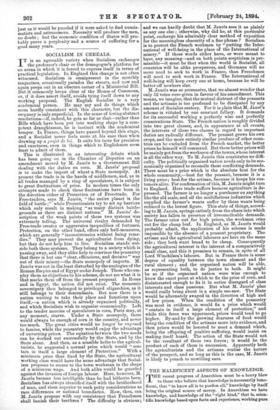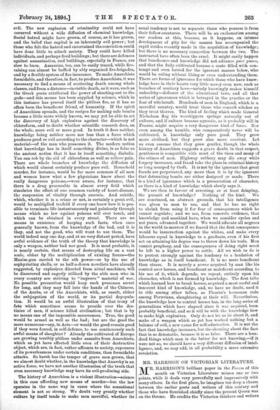THE MALEFICENT ASPECTS OF KNOWLEDGE.
THE recent progress of Anarchism must be a heavy blow to those who believe that knowledge is necessarily bene- ficent, that "to know all is to pardon all," knowledge by itself being the original source of mercy. In Anarchism we have knowledge, and knowledge of the "right kind," that is, scien- tific knowledge based upon facts and experience, working pure
evil. The new explosion of criminality could not have occurred without a wide diffusion of chemical knowledge. Social hatred might have grown, of course, as it has grown, and the belief that capital is an inherently evil power; but those who felt the hatred and entertained the conviction could have done little to attack society. They could have killed individuals, and perhaps fired buildings; but there are defences against assassination, and buildings, especially in France, are slow to burn. Assassins, too, can be easily traced, while fire- raising can almost be baffled by ably organised fire-brigades, and by a flexible system of fire insurance. To make Anarchists formidable, and therefore, in fact, to produce Anarchists, it was necessary to find a means of scattering death among whole classes, and from a distance—invisible death, as it were, such as the Greek poets attributed the power of shooting-out to the gods—and this means has been supplied by science, which in this instance has proved itself the pitiless foe, as it has so often been the beneficent friend, of humanity. If the spirit of Anarchism spreads, and the recipes for making safe bombs become a little more widely known, we may yet be able to set the discovery of high explosives against the discovery of chloroform, and to doubt whether scientific research does, on the whole, more evil or more good. In troth it does neither, knowledge being neither more nor less than a force which produces good or evil according to the character—which is not material—of the man who possesses it. The modern notion that knowledge has in itself something divine, is as false as the ancient notion that it has in itself something diabolic. You can rob by the aid of chloroform as well as relieve pain. There are whole branches of knowledge the diffusion of which would almost certainly produce pure evil. Household murder, for instance, would be far more common if all men and women knew what a few physicians know about the really dangerous poisons,—were aware, for instance, that there is a drug procurable in almost every field which simulates the effect of one common variety of heart-disease, the suspension of vitality through anaemia. And suicide, which, whether it is a crime or not, is certainly a great evil, would be multiplied tenfold if every one knew how it is pos- sible to terminate life instantaneously and painlessly through means which no law against poisons will ever touch, and which can be obtained in every street. There are no means in existence of keeping such facts, when once generally known, from the knowledge of the bad, and it is they, and not the good, who will want to use them. The world indeed may one day, and at no very distant period, have awful evidence of the truth of the theory that knowledge is only a weapon, neither bad nor good. It is most probable, it is nearly certain, that means of destroying life on a vast scale, either by the multiplication of existing forces—the Maxim-gun carried to the nth power—or by the use of asphyxiating shells, or as half-a-dozen novelists have already suggested, by explosives directed from aerial machines, will be discovered and eagerly utilised by the able men who in every country are striving to "improve" material of war. No possible precaution would keep such processes secret for long, and they may fall into the hands of the Chinese, of the Arabs, or of the Anarchists, with, as result, either the subjugation of the world, or its partial depopula- tion. It would be an awful illustration of that irony of fate which sometimes seems to preside over the des- tinies of men, if science killed civilisation ; but that is by no means one of the impossible occurrences. True, the good would be armed as well as the bad ; but are the good the more numerous—say, in Asia—or would the good remain good if they were forced, in self-defence, to use continuously such awful means of slaughter ? Already the cultivated of Europe are growing terribly pitiless under assaults from Anarchists, which as yet have effected little even of their destructive object, which are, in fact, rather affronts to society, exposures of its powerlessness under certain conditions, than formidable attacks. So harsh has the temper of grave men grown, that we almost doubt whether, in the knowledge that Anarchy is an active force, we have not another illustration of the truth that even necessary knowledge may have its evil-producing side.
The history of Anarchism is a violent illustration—science in this case affording new means of murder—but the law operates in the same way in cases where the sensational element is not so strong. We doubt very greatly whether culture by itself tends to make men merciful, whether its
usual tendency is not to separate those who possess it from their fellow-creatures. There will be an exclamation among our readers at this, because, as it happens, an intense development of pity for the masses has accompanied the rapid strides recently made in the acquisition of knowledge; but there is no necessary connection between the two. The instructed have often been the cruel. It might easily happen that beneficence and knowledge did not advance pari paasu, and that the fully cultivated became a caste filled with con- tempt and even hatred for the ignorant masses below, who would be ruling without lilting or even understanding them. There are forms of ignorance for which those who have know- ledge have in their hearts very little mercy even now, such as breaches of sanitary laws—nobody knowingly makes himself unhealthy—defiance of the educational laws, and all that series of ignorances which is betrayed in the practice or the fear of witchcraft. Hundreds of men in England, which is a. merciful country, would treat those who consult witches as they treat thieves. The kind of feeling which made General Nicholson flog his worshippers springs naturally out of culture, and if culture became agnostic, as it probably will in France, might acquire a very dangerous kind of force. Nor even among the humble, who comparatively never will be cultivated, is knowledge only pure good. They grow more civilised, but they grow also more esurient. Let us even assume that they grow gentler, though the whole history of Anarchism suggests a grave doubt in that respect, gentleness is compatible with most of the vices and many of the crimes of men. Highway robbery may die away while forgery increases, and fraud take the place in criminal history so long usurped by theft. It is not by the ignorant that great frauds are perpetrated, any more than it is by the ignorant that detonating bombs are either designed or made. There is a kind of ignorance which is a preservation of character, as there is a kind of knowledge which slowly saps it.
We are then in favour of arresting, or at least delaying, the pursuit of knowledge ? Nothing of the kind. We are convinced, on abstract grounds, that his 'intelligence was given to man to use, and that he has no right to shrink from using it for fear of consequences which he cannot regulate; and we see, from concrete evidence, that knowledge and mankind have, when we consider cycles and not years, advanced together. We would educate all negroes in the world to-morrow if we feared that the first consequence would be insurrection against the whites, and make every labourer equal in knowledge to a graduate, even if his first act on attaining his degree was to throw down his tools. Men cannot prophesy, and the consequences of doing right must. be left to a higher power to settle. All we wish to do is to protest strongly against the tendency to a laudation of knowledge as in itself beneficent. It is no more beneficent than steam. It is merely a power acquired by man like his control over horses, and beneficent or maleficent according to his use of it, which depends, we repeat, entirely upon his character, which is not formed by knowledge. The first tribe which learned how to break horses, acquired a most useful and innocent kind of knowledge, and, we have no doubt, used it to ride among other tribes, as Pizarro's horsemen rode among Peruvians, slaughtering at their will. Nevertheless, the knowledge how to control horses has, in the long series of generations which have elapsed since it was acquired, been probably beneficial, and so it will be with the knowledge how to make high explosives. Only do not let us lie about it, and make of a weapon which as yet has worked nothing but a balance of evil, a new cause for self-admiration. It is not the fact that knowledge increases, but the shouting about the fact that is so detestable, because it is so false. There are a hun- dred things which man is the better for not knowing,—if it were not so, we should have a very different diffusion of intel- ligence, and, we may add, in all probability a more extensive revelation.



































 Previous page
Previous page